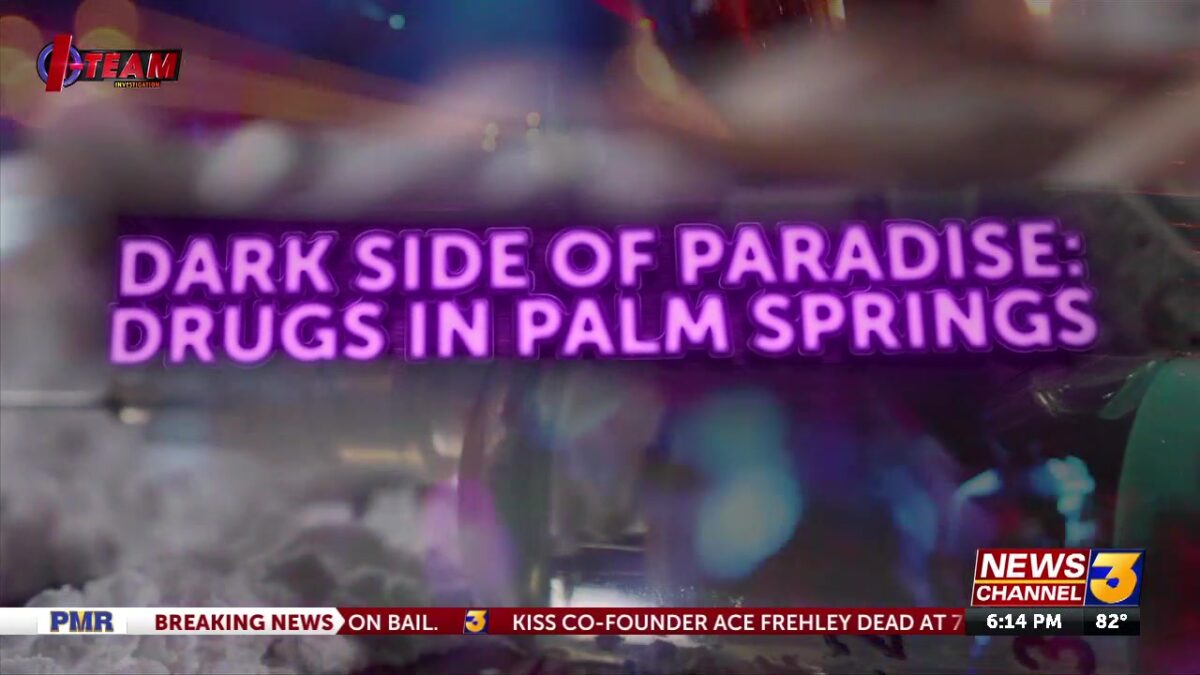‘Dark Side of Paradise’ – Drugs in the Palm Springs LGBTQ+ Community

Peter Daut
PALM SPRINGS, Calif. (KESQ) – News Channel 3 has reported extensively on the drug crisis impacting the Coachella Valley, affecting people from all walks of life.
Anchor Peter Daut turned the focus to the LGBTQ+ community, which, according to national data, is far more likely to use illegal drugs than the general population. He spoke with several local gay men who said there is a “hidden, dangerous” subculture of drug use in Palm Springs, and they want to bring the problem out of the shadows.
Across the country, and especially here in the desert, drugs like crystal meth have taken a devastating toll on the queer community. Often linked to parties and sex, they create a powerful high that can quickly turn deadly.
Clinical psychologist Wesley Detwiler works with members of the queer community battling addiction, a struggle he knows firsthand. He’s been sober from crystal meth for ten years.
“Everything I did in my life in some way, shape, or form had to do with crystal meth; using crystal meth; getting it; so it was pretty pervasive in my life,” Detwiler said. Daut asked him, “How easy is it to get drugs here in Palm Springs?” He answered: “It’s pretty easy. People go online, and they meet people on the apps, they go over, they might not even be looking for the drugs, but they walk in and there they are.”
Studies show men who have sex with men are significantly more likely to use illegal drugs than their heterosexual counterparts. According to the National Survey on Drug Use and Health/Columbia University, gay men are three times more likely than straight men (9.2% vs. 3.2%) to use stimulants like crystal meth.
“We’ve got circuit parties; we’ve got this culture of fun and celebration, especially coming through our AIDS crisis and our AIDS epidemic. There’s this mentality of living life in the moment, living for now. And crystal meth really feeds into that. It can be really fun, but it’s just a really good example of when fun becomes dangerous,” Detwiler said.
That danger recently hit close to home for Detwiler. His friend, Glenn Soukesian, known to many as adult gay film star Colton Ford, was found dead in May near a Palm Springs hiking trail. The coroner ruled his death an accidental overdose from MDMA, better known as Ecstasy or Molly.
“He was always gracious and kind, and always took the time to get to know somebody and look you in the eyes. It was a real tragedy what happened to him,” he said.
Tragedy also became a turning point for Palm Springs resident Bob Rahl. He quit using crystal meth four years ago, after losing his close friend Jason to a drug overdose at just 42-years-old.
“His death still haunts me, and it’s one of the reasons I’m still sober today,” Rahl said. Daut asked him: “Do you think this is a major problem in our community?” He answered: “Definitely. People are pretty desperate. They don’t have the coping mechanisms for situations that life is going to throw at them.”
Meth is a big part of what’s called the “party and play” or “chemsex” subculture. The drug can increase energy, heighten sex drive, and keep users awake for days, before they crash hard. And in a destination known for escape and indulgence, Palm Springs can make it easy for that danger to spread.
Rahl pointed to a recent case involving Hakan Isik of Desert Hot Springs, charged with several felony counts for drugging and sexually assaulting multiple men he met through a dating app. If convicted on all counts, Isik faces life in prison.
“I have seen firsthand the damage he has done to people,” Rahl said. “There’s a very dark world in Palm Springs of people who use drugs that will just as soon leave you dead on the side of the road than help you.”
Before becoming sober five years ago, Rory Slikker was a homeless drug addict living on the streets of Palm Springs. “It was really easy to get sucked into the meth underbelly here in Palm Springs. It’s like the dark side of the moon here. We have our sacred witching hours between 2 and 5AM when the world is asleep. That’s when we function and I thrived in that,” he said.
Slikker now works at Rainbow Hill Recovery, an outpatient mental health and substance abuse program provided by queer people, for queer people. “We can’t help people who are dead. There are resources more readily available than people realize,” he said.
Nearly one-third of bisexual and gay men dealt with a substance use disorder in 2022, according to the Substance Abuse and Mental Health Services Administration. That’s much higher than the nearly 21% of straight men. Meanwhile, stimulant and cocaine deaths continue to rise, partly because many drugs are now laced with fentanyl.
“The substances are only getting heavier and heavier. The meth that I used when I was out was only a fraction of the potency of what it is today, and I’m very grateful that I am alive today because fentanyl really wasn’t in the scene,” Slikker said.
Meanwhile, Wesley Detwiler said recovery is possible, but it takes support and a real commitment to change. “Find that foothold. But you’ve got to be open, you’ve got to be willing, and you’ve got to be honest about what it is you want, and be ready to do the work,” he said.
Short-term meth use can lead to insomnia, hallucinations, and anxiety. Long-term users face severe tooth decay, organ damage, and even stroke.
But even after the darkest moments, recovery is possible, and help is out there. Palm Springs has a strong recovery community.
Resources include:
https://www.ruhealth.org/behavioral-health/sapt/locations